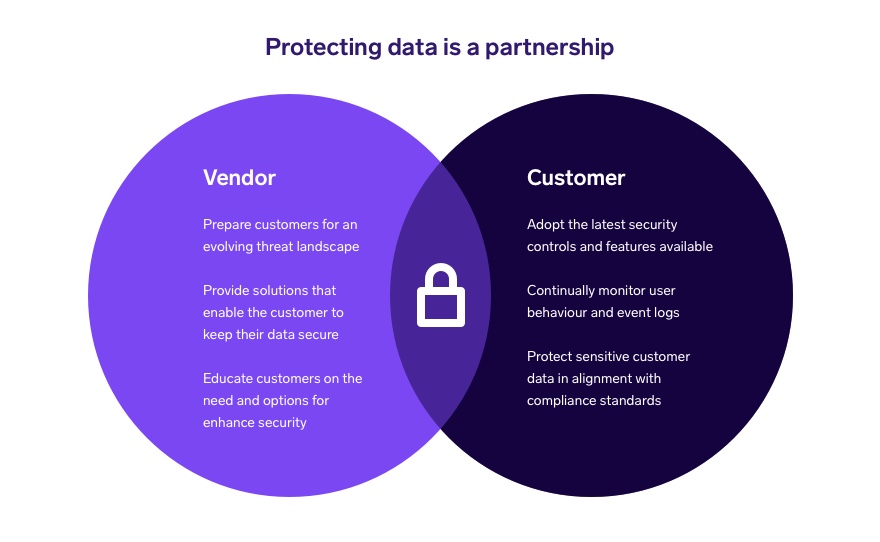Insights
Cloud security: a shared responsibility and vital practice
29 Sep 2022
29 Sep 2022

The pandemic has created a greater need for online adoption, forcing organisations to evolve by making the switch to cloud-based applications.
While the cloud enables organisations to streamline their operations, scale business quickly, and reduce the cost of ownership, it does not alleviate cyber security concerns.
Organisations that overlook cloud security, risk paying the price. The average cost of a data breach increased by 10% from 2020 to 2021 amounting to US$4.8 million, according to IBM’s Cost of a Data Breach Report 2021.
Comprehensive cloud security is non-negotiable for businesses and organisation utilizing cloud-technologies for their modernisation and customer-centred strategies.
The first step in optimising your security posture is to deploy technologies such as Salesforce.com, Microsoft, and Adobe, to name a few. These businesses commit significant amounts of revenue and manpower to ensure their technologies have best in class defences to ward of cyber attacks.
The second step is understanding the responsibility of users as well as custodians of the technology. Companies, such as Salesforce.com, reinforce that security compliance should exhibit a 50:50 model between the vendor and the client.
Accel Digital’s Executive Director of Strategy and Growth, Dannielle K. Pearson who spent a decade working in the US intelligence community before beginning her career in SaaS, recognises the unquestionable need for cloud security awareness.
“The environment is fluid, which means the maintenance and security threats are equally fluid,” she said. “This fluidity requires customers to be vigilant and have security protocols and tools in place.”

Put simply cloud security is the practice of installing policies, protocols and controls that protect your applications and any associated data from exposure to the outside world.
Securing data, applications, and infrastructure across the various cloud environments (public, private, and hybrid clouds) is an intricate task that requires sophisticated measures and constant vigilance.
To mitigate the risk of cloud breaches, malware attacks, and data exposure, organisations need to employ cloud security services that offer a thorough audit to identify any gaps or vulnerabilities. These vulnerability assessments can be as sophisticated as SOC2, ISO 27001, NIST, or Essential 8 Assessments. At the very least your organisation needs to have a basic understanding of the extent to which it’s adopted cloud vendor recommended security settings.
“Staying on top of all these risks – general architectural risks, risks specific to a particular organisation, as well as the evolving and changing nature of cyber security risks - is complex and requires dedicated resources,” said Pearson.
Cloud security best practices encourage organisations to consistently monitor cloud settings and any required security for new features and desired plug-ins.
In short, yes.
“The customer's role is to be proactive in security rather than reactive,” said Pearson. “On the other end vendors need to have nominated personnel in the business, including tech teams that are across the latest changes to security settings and recommended practices.”
The customer's role is to be proactive in security rather than reactive
Internal expertise is essential in order to keep across the necessary changes to security settings that come with application updates and new plug-ins. Dual-purpose decisions need to be made that secure architecture while enhancing performance.
“Sometimes to achieve business driven functionality, some security settings will be intentionally muted to optimise performance,” said Pearson. “Business leaders and technology teams need to work together to determine what level of risk they take on to maximise performance while still securing their architecture.”
A range of strategies and systems can be applied to ensure an organisation’s IT infrastructure and data are keeping to cloud security best practices.
“Successful organisations create robust security strategies and invest in internal capability on the SaaS platform all the while developing relationships with reliable external partners” she said.
In this dynamic environment, organisations need to stay one step ahead to be guaranteed foolproof cloud security solutions.
Get the crucial advice your business needs to adopt leading cloud security solutions by partnering with Accel.
In the complex, ever-evolving cyber landscape, our services work to protect your business. We design and build highly secure eCommerce and website experiences – making the online marketplace a safer place for businesses and customers alike.
For more information about security services, contact us.
Our advanced cybersecurity knowledge and industry expertise empower online businesses with greater security.
We use deep cyber expertise to provide the crucial advice and support you need to transform your security posture.
eCommerce platforms created by Accel allow businesses to guarantee their customers a secure shopping experience, every time.
Accel handles your day-to-day online security needs to keep your business innovative and safe in today’s ever-shifting landscape.
